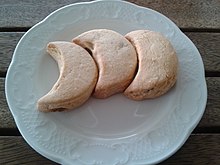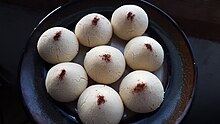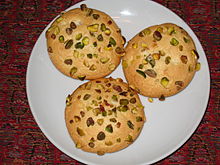food.wikisort.org - Dish
Qurabiya (also ghraybe, ghorayeba, ghoriba (Arabic: غريبة), ghribia, ghraïba, or ghriyyaba and numerous other spellings and pronunciations) is a shortbread-type biscuit, usually made with ground almonds. Versions are found in most Arab and Ottoman cuisines, with various different forms and recipes.[1][2] They are similar to polvorones from Andalusia.[3][4][5]
 Crescent shaped qurabiya | |
| Type | Shortbread |
|---|---|
| Main ingredients | Almond flour, sugar, egg white, vanilla |

In the Maghreb and Egypt, they are often served with Libyan tea, Arabic coffee or Maghrebi mint tea.
History
A recipe for a shortbread cookie similar to ghorayebah but without almonds, called in Arabic khushkanānaj gharib (exotic cookie), is given in the earliest known Arab cookbook, the 10th-century Kitab al-Ṭabīḫ.[6] Kurabiye appears in the Ottoman cuisine in the 15th century.[7][dubious ]
There is some debate about the origin of the words. Some give no other origin for the Turkish word kurabiye than Turkish, while others have given Arabic or Persian.[7] Among others, linguist Sevan Nişanyan has given an Arabic origin, in his 2009 book of Turkish etymology, from ġurayb or ğarîb (exotic).[8][9] However, as of 2019, Nişanyan's online dictionary now gives the earliest known recorded use in Turkish as the late 17th century, with an origin from the Persian gulābiya, a cookie made with rose water, from gulāb, related to flowers. He notes that the Syrian Arabic words ġurābiye/ġuraybiye likely derive from the Turkish.[10]
Regional variations
Algeria
Ghribia (Algerian Arabic: غريبية)[11][12][13]
- Ghribia with almonds
- Ghribia with peanuts
- Ghribia with walnuts
- Ghribia with pistachios
Armenia
Khourabia[14] (Armenian: Ղուրաբիա) is the Armenian version sometimes referred to in English as Armenian butter cookie or Armenian shortbread cookie.[15] Khourabia was traditionally made with three ingredients: butter, sugar, and flour and usually shaped like bread, wheat ear, or horse shoe signifying health, wealth, and prosperity. It was mostly eaten during the Easter, Christmas, and New Year celebrations. Later, more ingredients were added, like eggs, cinnamon, and walnuts.
Bulgaria
Kurabii name of the Bulgarian cuisine and the many varieties of cookie, a popular sweet variety. Especially during the holiday season, and a variety of jams produced via the new year with powdered sugar cookies decorated with cute shapes are called maslenki.[citation needed]
Cyprus & Greece


The Greek version, called kourabiedes or kourabiethes[1][2] (Greek: κουραμπιέδες; plural of kourabies κουραμπιές) resembles a light shortbread, typically made with almonds. Kourabiedes are sometimes made with brandy, usually Metaxa, for flavouring, though vanilla, mastika or rose water are also popular.[16] In some regions of Greece, Christmas kourabiedes are adorned with a single whole spice clove embedded in each biscuit.[17] Kourabiedes are shaped either into crescents or balls, then baked till slightly golden. They are usually rolled in icing sugar while still hot, forming a rich butter-sugar coating.[18] Kourabiedes are especially popular for special occasions, such as Christmas or baptisms.[19] though they are popular all year round.
The Greek word kourabiedes comes from the Turkish word kurabiye,[20] which is related to qurabiya, a family of Middle Eastern cookies.
Iran

In Tabriz, they are made of almond flour, sugar, egg white, vanilla, margarine and pistachio. It is served with tea, customarily placed on top of the teacup to make it soft before eating.[citation needed]

Kuwait
- Ghoriba with Cardamom
- Ghoriba with pistachio
- Ghoriba with saffron
Levant
- Ghoriba with pistachio
- Ghoriba with Rose water
Libya
Ghraïba Libyan Arabic translation : | غربية
- Ghoriba with peanuts
- Ghoriba with almonds
- Ghoriba with walnuts
Morocco
Ghoriba (Moroccan Arabic: غْرِيبَة) in Morocco and other parts of the Maghreb, the popular cookies often use semolina instead of white flour, giving a distinctive crunch.[1][2]
the original Ghriba is made from flour and flavored with lemon or orange zest and cinnamon, this sweet is usually served at parties, accompanied by mint tea or coffee.[23]
- Mlouwza, made with almonds and sugar flavored with orange flower water
- Ghoriba bahla
- Ghoriba dyal zite
- Ghoriba mramla
Turkey

The word kurabiye is used to refer to a variety of biscuits in Turkey, not necessarily local ones, although various types of local kurabiye are made; including acıbadem kurabiyesi and un kurabiyesi.
Tunisia
Ghraïba (Tunisian Arabic: غريبة)
- Ghraïba bidha, made with wheat flour
- Ghraïba droô, made with sorghum flour
- Ghraïba homs, made with chickpea flour
See also
- Almond cookie
- Polvorón
- Hallongrotta
- List of almond dishes
- List of shortbread biscuits and cookies
- Panellets
- Şekerpare
- Un kurabiyesi
- Osmania Biscuit
- İzmir Bomb Kurabiye
- Kavala Almond Cookies
- Murabbalı mecidiye
References
- Davidson, Alan (21 August 2014). The Oxford Companion to Food. OUP Oxford. ISBN 9780191040726 – via Google Books.
- Marks, Gil (17 November 2010). Encyclopedia of Jewish Food. HMH. ISBN 9780544186316 – via Google Books.
- Williams, Stephanie (5 August 2012). "Lost and loving it in Morocco". Herald Sun. Retrieved 1 April 2015.
- Kragen, Pam (19 March 2013). "Cookbook a love letter to Morocco". U-T San Diego. Retrieved 1 April 2015.
- Catherine Hanger (2000). Morocco: World Food. Lonely Planet. p. 98. ISBN 1-86450-024-7.
- Nasrallah, Nawal (26 November 2007). Annals of the Caliphs' Kitchens: Ibn Sayyār al-Warrāq's Tenth-Century Baghdadi Cookbook. BRILL. pp. 418, 569. ISBN 9789047423058 – via Google Books.
- Muhammed bin Mahmûd-ı Şirvânî (2005). 15. yüzyıl Osmanlı mutfağı. Gökkubbe. p. 259. ISBN 978-975-6223-84-0.
- Nişanyan, Sevan (2009). Sözlerin soyağacı: çağdaş Türkçenin etimolojik sözlüğü. Everest Yayınları. ISBN 9789752896369 – via Google Books.
- Salloum, Habeeb (25 June 2013). Sweet Delights from a Thousand and One Nights: The Story of Traditional Arab Sweets. I.B.Tauris. p. 128. ISBN 9780857733412 – via Google Books.
- Nişanyan, Sevan. "Kurabiye". Nişanyan Sözlük. Retrieved 2019-01-04.
- Labourdette, Jean-Paul; Auzias, Dominique (2012). Alger 2012-2013 (in French). Petit Futé. p. 61. ISBN 9782746963771. Retrieved 1 April 2015.
- Bellahsen, Fabien; Rouche, Daniel (2005). Délices de Tunisie (in French). Paris: EDL. ISBN 2-84690-243-7.
- Talhouas, Nathalie; Bonnet, Élodie; Volpatti, Céline; Bizos, Didier (2010). Douceurs du Maghreb; Beyrouth : Albouraq (in French). ISBN 978-2-84161-485-1.
- Rinsky, Glenn; Rinsky, Laura Halpin (2008-02-28). The Pastry Chef's Companion: A Comprehensive Resource Guide for the Baking and Pastry Professional. John Wiley & Sons. ISBN 978-0-470-00955-0.
- Armenians in America. Armenian General Benevolent Union of America, Incorporated. 1977.
- Tessa Kiros, Food from Many Greek Kitchens, ISBN 1741966841, p. 39
- Sam Sotiropoulos (2009-12-23). "Greek Food Recipes and Reflections, Toronto, Ontario, Canada". Greekgourmand.blogspot.com. Retrieved 2014-03-16.
- "Irene's Kourabiedes (Kourabiethes) (Greek Butter Cookies)". Thursdayfordinner.com. Retrieved 2015-02-27.
- Sourligas, Christos (22 October 2019). My Big Fat Greek Cookbook: Classic Mediterranean Soul Food Recipes. Simon and Schuster. ISBN 9781510749849 – via Google Books.
- Georgios Babiniotis, Dictionary of Modern Greek, s.v.
- Jacob, Jeanne; Ashkenazi, Michael (2014). The World Cookbook: The Greatest Recipes from Around the Globe (2nd ed.). p. 738. ISBN 9781610694698.
- "حوليات الآداب والعلوم الاجتماعية". مجلس النشر العلمي، جامعة الكويت. Issues 317-321: 118.
- "15 favorite Moroccan culinary specialties". Retrieved 2022-04-19.
External links
На других языках
- [en] Qurabiya
[es] Ghorabiye
La ghorabiye o qurabiyə (azerí: قرابیه qurabiyə , persa: قرابیه, turco: kurabiye) es una galleta azerí iraní de la ciudad de Tabriz, capital de la provincia iraní de Azerbaiyán Oriental. Se hace con harina de almendra, azúcar, clara de huevo, vainilla, margarina y pistacho. Se sirve con té, siendo costumbre ponerla encima de la taza para ablandarla antes de comer.[ru] Курабье
Курабье́ — восточная сладость в виде песочного печенья[3].Другой контент может иметь иную лицензию. Перед использованием материалов сайта WikiSort.org внимательно изучите правила лицензирования конкретных элементов наполнения сайта.
WikiSort.org - проект по пересортировке и дополнению контента Википедии